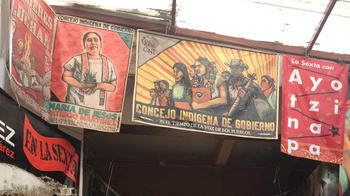Political Anthropology
Plakate des Consejo Indígena de Gobierno in einem zapatistischen Zentrum in Mexiko-Stadt
Image Credit: Pia Berghoff
Political anthropology examines the symbolic-cultural dimensions of power. While classical political anthropology dealt with the understanding of systems and structures of political forms of organization of indigenous groups within colonial societies, the focus today is on the study of political processes and dynamics of postcolonial societies. Power structures and ordering systems are analyzed from the perspective of social actors: the research focuses on political negotiation processes, political cultures, and rituals.
In Latin American studies, political anthropology refers in particular to local political actors - e.g. indigenous forms of government, social movements, non-state political actors - and their struggles with nation-state structures and institutions, as well as gender relations and gender roles within political processes. In the area of Ancient American Studies/Cultural and Social Anthropology, questions of political anthropology are examined, especially in connection with other focal points - such as migration research and gender studies. The following questions are in the foreground: Which gender-specific differences can be identified in political processes? How can political action in transnational spaces be understood?
